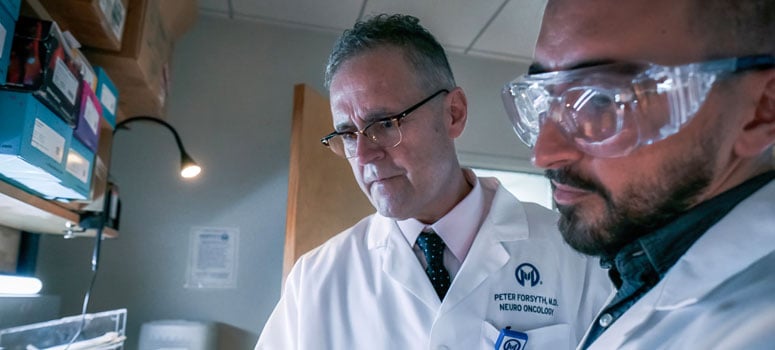New Study Shows Promise for Difficult to Treat Brain Metastases
Roughly 10% to 15% of women with stage 4 triple-negative or HER2 positive breast cancer develop disease that spreads to the brain. Unfortunately, patients who develop this type of metastasis, known as leptomeningeal disease, live only about two to three months after diagnosis.
Moffitt Cancer Center has launched a new clinical trial using a groundbreaking breast cancer specific dendritic cell vaccine to treat this subset of patients. The vaccine is administered in the brain and spinal fluid space of the brain that is often difficult to access.
Repurposing Existing Novel Therapies
A dendritic cell vaccine is created from immune cells that are harvested from each individual patient and then used to create a personalized vaccine. Previously, the vaccine was used solely in localized, early stage breast cancer.
While many cancer patients use a port inserted into a vein to receive treatment intravenously, treatment of leptomeningeal disease needs access to the fluid space in the brain to deliver the vaccine directly to the cancer cells.
Accessing This Difficult To Treat Area
In preclinical animal models, researchers inserted a device called an Ommaya reservoir, or a brain port, into the scalp to deliver several doses of the dendritic vaccine into the brain and spinal fluid. Over time, the tumors were destroyed with most of the mice being cured. The study also uncovered an unexpected benefit: If there was a recurrence, the retrained cells continued to fight the cancer.

The Future Is Bright for This Treatment
Dendritic cells as an immune cell therapy are highly customizable. Moffitt is looking to expand the therapy to other cancer associated central nervous system diseases that have spread to the fluid space of the brain. Forsyth’s lab is investigating the delivery of this immune cell therapy into the fluid space of the brain and spinal cord to treat melanoma with high expression of HER3.
Advance the Standard of Care Today and in the Future
Phase 1 clinical trials like this play an important role in the success of research efforts by allowing physician scientists to observe the safety and efficacy of newly developed cancer therapies.
“This new trial is a fantastic opportunity to take our work from the lab to the clinic and try to make a difference. The opportunity to give hope to these patients is important,” Forsyth said.

Dr. Peter Forsyth, Chair of the Department of Neuro-Oncology, collaborates with some of the brightest minds in the world to understand how and why tumors develop in the central nervous system, as well as what causes their growth and resistance to therapy.



